Globetrotting
ebook ∣ African American Athletes and Cold War Politics · Sport and Society
By Damion L. Thomas

Sign up to save your library
With an OverDrive account, you can save your favorite libraries for at-a-glance information about availability. Find out more about OverDrive accounts.
Find this title in Libby, the library reading app by OverDrive.



Search for a digital library with this title
Title found at these libraries:
| Library Name | Distance |
|---|---|
| Loading... |
Throughout the Cold War, the Soviet Union deplored the treatment of African Americans by the U.S. government as proof of hypocrisy in the American promises of freedom and equality. This probing history examines government attempts to manipulate international perceptions of U.S. race relations during the Cold War by sending African American athletes abroad on goodwill tours and in international competitions as cultural ambassadors and visible symbols of American values. Damion L. Thomas follows the State Department's efforts from 1945 to 1968 to showcase prosperous African American athletes including Jackie Robinson, Jesse Owens, and the Harlem Globetrotters as the preeminent citizens of the African Diaspora, rather than as victims of racial oppression. With athletes in baseball, track and field, and basketball, the government relied on figures whose fame carried the desired message to countries where English was little understood. However, eventually African American athletes began to provide counter-narratives to State Department claims of American exceptionalism, most notably with Tommie Smith and John Carlos's famous black power salute at the 1968 Mexico City Olympics. Exploring the geopolitical significance of racial integration in sports during the early days of the Cold War, this book looks at the Eisenhower and Kennedy administrations' attempts to utilize sport to overcome hostile international responses to the violent repression of the civil rights movement in the United States. Highlighting how African American athletes responded to significant milestones in American racial justice such as the 1954 Brown v. Board of Education decision and the passage of the 1964 Civil Rights Act, Thomas surveys the shifting political landscape during this period as African American athletes increasingly resisted being used in State Department propaganda and began to use sports to challenge continued oppression.
| Cover Title Page Copyright Contents Acknowledgments Introduction 1. The Showcase African American: Paul Robeson, Jackie Robinson, and the Politics of Cold War 2. "Spreading the Gospel of Basketball": The Harlem Globetrotters, the State Department, and the 3. Playing Politics: The Formation of the U.S. Cold War–Era Athletic Foreign Policy 4. "The Good Negroes": Propaganda and the Racial Crisis 5. Black Power: International Politics and the Revolt of the Black Athlete Epilogue Notes Bibliography Index | "This accessible, interesting history will broaden sport historians' understanding of sport and the civil rights movement, injecting an internationalist framework that was critical to the viewpoint of the era's African American athletes."—Aram Goudsouzian, author of King of the Court: Bill Russell and the Basketball Revolution
"What Damion L. Thomas does in Globetrotting is put the role of athletes from and center, providing welcome depth to this well-known story line. Thomas also demonstrates how these 'Cold Warriors' began to control the diplomatic missions, straying from the State Department's script to interpret their travels for themselves."—The Journal of American History
"Provides an extensive chronology of how racial identity unfolded during the Cold War years, using sport as a ploy that all was well in the U.S. Recommended." — Choice
"Globetrotting reveals surprising evidence of the importance the U.S. government placed on sports in waging the Cold War, and makes compelling arguments regarding the changing tenor of African American athletes' involvement in foreign policy initiatives amid the changing climate of the civil rights movement."—American Historical Review
...
| Cover Title Page Copyright Contents Acknowledgments Introduction 1. The Showcase African American: Paul Robeson, Jackie Robinson, and the Politics of Cold War 2. "Spreading the Gospel of Basketball": The Harlem Globetrotters, the State Department, and the 3. Playing Politics: The Formation of the U.S. Cold War–Era Athletic Foreign Policy 4. "The Good Negroes": Propaganda and the Racial Crisis 5. Black Power: International Politics and the Revolt of the Black Athlete Epilogue Notes Bibliography Index | "This accessible, interesting history will broaden sport historians' understanding of sport and the civil rights movement, injecting an internationalist framework that was critical to the viewpoint of the era's African American athletes."—Aram Goudsouzian, author of King of the Court: Bill Russell and the Basketball Revolution
"What Damion L. Thomas does in Globetrotting is put the role of athletes from and center, providing welcome depth to this well-known story line. Thomas also demonstrates how these 'Cold Warriors' began to control the diplomatic missions, straying from the State Department's script to interpret their travels for themselves."—The Journal of American History
"Provides an extensive chronology of how racial identity unfolded during the Cold War years, using sport as a ploy that all was well in the U.S. Recommended." — Choice
"Globetrotting reveals surprising evidence of the importance the U.S. government placed on sports in waging the Cold War, and makes compelling arguments regarding the changing tenor of African American athletes' involvement in foreign policy initiatives amid the changing climate of the civil rights movement."—American Historical Review
...







